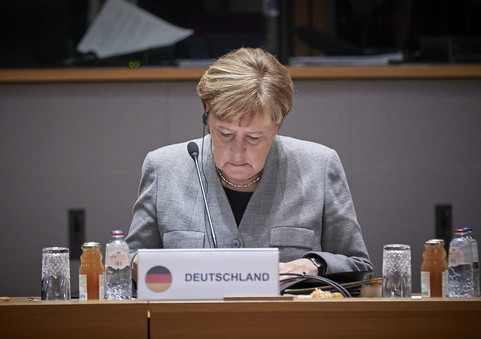[ad_1]

German chancellor Angela Merkel and the recently-elected chairman of her Christian Democratic party (CDU), Armin Laschet – who hopes to succeed Merkel – have clashed over Covid-19 measures as an increasing third wave of infections grips the country.
Laschet, who is also state premier of North Rhine-Westphalia, on Monday (29 March) defended his more relaxed approach to measures, which Merkel pointedly criticised on television over the weekend.
Laschet hit back against the criticism, saying it “doesn’t help us if the federal government and states are pushing responsibility to each other”, AFP reported.
Merkel on Sunday in a flagship TV interview called several states out for failing to impose “emergency brake” rules requiring tougher restrictions for regions that reach a threshold for high infection rates.
She criticised Laschet for “choosing an implementation that carries too much room for manoeuvre”.
“We must now implement the appropriate measures with great seriousness,” Merkel said, according to the national DPA news wire.
The chancellor added that if this did not happen, she would have to think about overriding state regulations “in the very foreseeable future”.
“We need action in the federal states,” Merkel said, adding: “We need to take the appropriate measures very seriously. Some states are doing it, others are not yet doing it”.
Laschet, who was elected as CDU chief in January, however, said that all 16 state premiers are “taking this very seriously”.
“Everyone wants the number of infections to go down and everyone has taken the appropriate measures for their state, which are very different,” Laschet said, according to AFP.
“I am sure that if we get additional proposals the state leaders will follow them,” Laschet told reporters, according to Bloomberg.
Laschet and the premier of Saarland, Tobias Hans, also CDU, said the easing of restrictions would go hand-in-hand with a ramping up of rapid antigen tests to trace and control third wave infections.
Hans, for his part, plans to end a lockdown in Saarland – opening up entertainment and sports facilities – as early as 6 April.
At a marathon meeting between regional leaders and Merkel last week, they had agreed to stick to national rules including strict lockdowns and curfews in areas with more than 100 new infections per 100,000 people over seven days.
However, under Germany’s federal system, ultimately the 16 states decide their own rules, and some have not imposed curfews and plan reopening measures.
Merkel had already announced a reversal of earlier, stricter, lockdown plans for Easter, citing logistical problems in implementing it.
The rapid spread of the British coronavirus variant B.1.1.7 has led to a sharp increase in new cases.
The Robert Koch Institute (RKI) health agency reported 9,872 new cases in 24 hours on Monday and a national incidence rate of 134.4 per 100,000 people over the last seven days.
The growing infection rate and sluggish vaccine roll-out have pushed the popularity of Merkel’s CDU-CSU alliance down, which now polls at 25 percent, only six months ahead of a general election.
The stakes are increasingly high politically for the conservative alliance in the pandemic, as the September elections and the post-Merkel era are approaching.
The Bavarian state premier, Markus Söder, who is also touted to run for the chancellery, backed Merkel’s plans for federal rules that bring the regional states in line.
He told the news programme, Tagesthemen, on Sunday that he could imagine assigning the federal state more power to “enforce clear rules” with an amendment of the pandemic law.
Any new federal powers would raise constitutional issues, and are also a politically-sensitive in a republic that, after World War Two, was rooted in strong federalism with checks on the national executive power.
[ad_2]
Source link